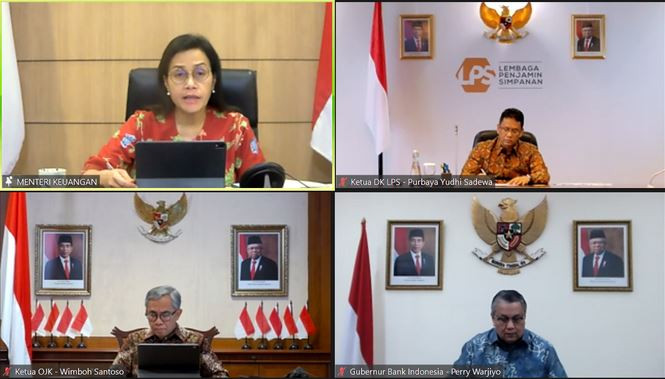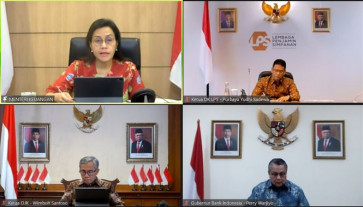Popular Reads
Top Results
Can't find what you're looking for?
View all search resultsPopular Reads
Top Results
Can't find what you're looking for?
View all search resultsIndonesia's economy showing signs of improvement
The country’s financial system remained stable in the third quarter and was expected to further support economic recovery going forward, said the KSSK.
Change text size
Gift Premium Articles
to Anyone
 Finance Minister Sri Mulyani Indrawati (clockwise), Deposit Insurance Corporation chairman Purbaya Yudhi Sadewa, Bank Indonesia Governor Perry Warjiyo and Financial Services Authority (OJK) chairman Wimboh Santoso attend the Financial System Stability Committee (KSSK) virtual press briefing on Tuesday. (Courtesy of the Finance Ministry/-)
Finance Minister Sri Mulyani Indrawati (clockwise), Deposit Insurance Corporation chairman Purbaya Yudhi Sadewa, Bank Indonesia Governor Perry Warjiyo and Financial Services Authority (OJK) chairman Wimboh Santoso attend the Financial System Stability Committee (KSSK) virtual press briefing on Tuesday. (Courtesy of the Finance Ministry/-)
I
ndonesia’s economy showed an improvement in the third quarter following a deep slump in the second quarter amid uncertainty caused by the coronavirus pandemic, the Financial System Stability Committee (KSSK) has said.
The country’s financial system remained stable in the third quarter and was expected to further support economic recovery going forward, said the committee, whose members are the finance minister, Bank Indonesia (BI) governor, the Financial Services Authority (OJK) chairman and the Deposit Insurance Corporation (LPS) chairman, on Tuesday.
“The domestic economy has gradually improved after experiencing pressure in the second quarter [...] supported by accelerated fiscal stimulus disbursement and an improvement in exports,” said Finance Minister Sri Mulyani Indrawati, who serves as the committee’s chair, in a virtual briefing. “External sector resilience was also maintained as reflected in the low current account deficit for the whole of 2020, supported by a trade surplus of US$8.03 billion in the third quarter.”
The coronavirus outbreak has disrupted business activity and weakened purchasing power, resulting in a hard-hit economy. Indonesia’s gross domestic product (GDP) shrank 5.32 percent in the second quarter and is expected to shrink further, albeit at a slower pace, in the third quarter, which means the country will enter into a recession.
Statistics Indonesia (BPS) will announce the third quarter GDP in early November.
Sri Mulyani said the macroeconomic stability remained well-managed as inflation was low in September at 1.42 percent yoy because of falling demand.
At the same time, foreign exchange reserves rose to $135.2 billion in September from $131.7 billion in June while the rupiah exchange rate depreciated by 4.2 percent point-to-point against the United States dollar amid the high uncertainty in the global financial markets. The rupiah erased some of its losses in March and April when the volatile market sent the currency down more than 20 percent.

















